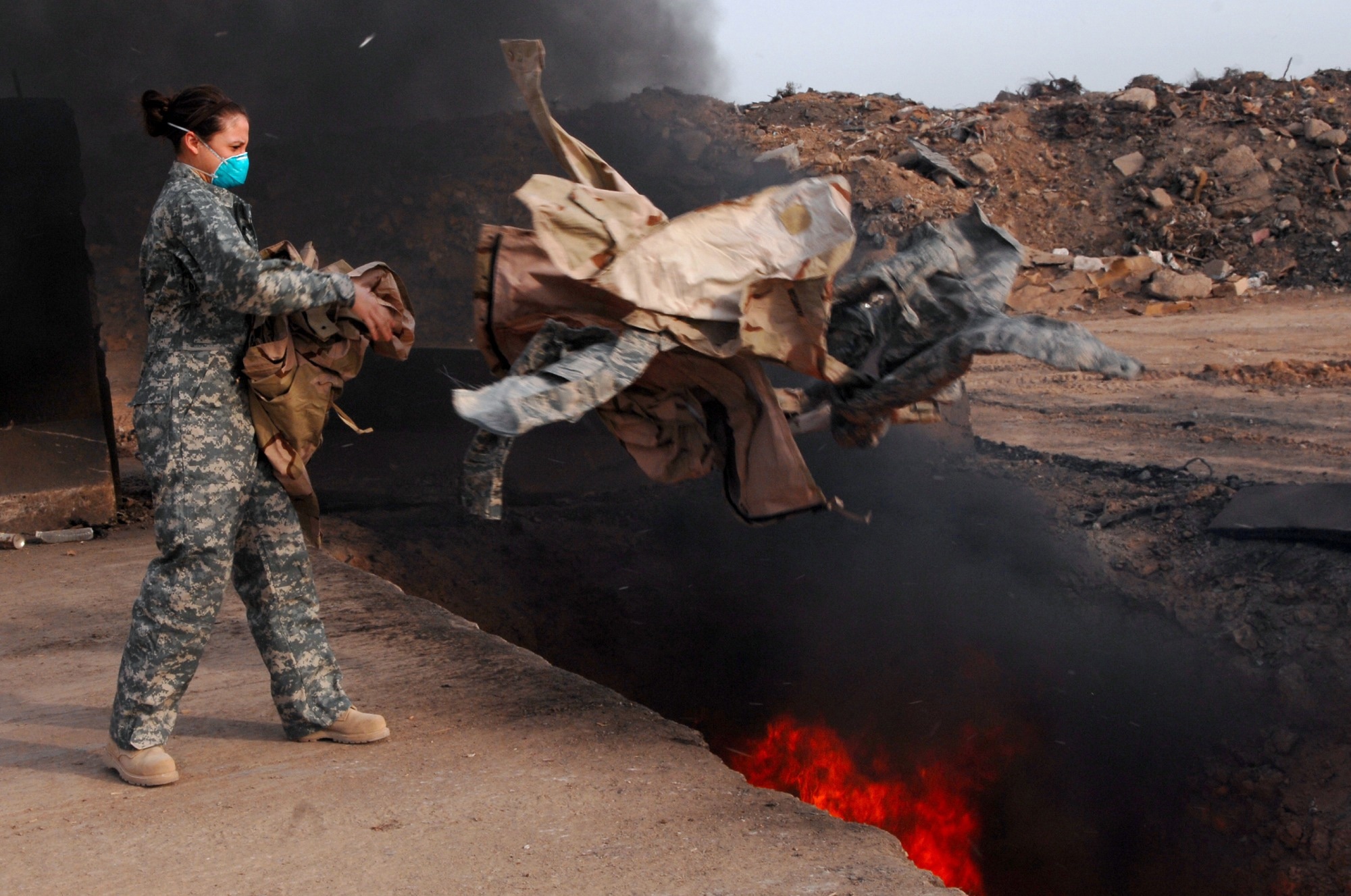The study revealed that extended deployment to bases utilizing open burn pits is linked to slightly increased odds of developing chronic obstructive pulmonary disease (COPD), asthma, ischemic stroke, and hypertension, suggesting potential adverse health outcomes linked to environmental factors while serving in the military.
 Study: Deployment to Military Bases With Open Burn Pits and Respiratory and Cardiovascular Disease. Senior Airman Julianne Showalter, Public domain, via Wikimedia Commons, en.wikipedia.org/wiki/Burn_pit. Accessed 29 Apr. 2024.
Study: Deployment to Military Bases With Open Burn Pits and Respiratory and Cardiovascular Disease. Senior Airman Julianne Showalter, Public domain, via Wikimedia Commons, en.wikipedia.org/wiki/Burn_pit. Accessed 29 Apr. 2024.
Background
The military of the United States has utilized open burn pits for the disposal of various materials, including medical, hazardous, and solid waste, during multiple operations in Iraq and Afghanistan.
Despite restrictions imposed by the Department of Defense (DOD) in 2009 and efforts to adopt alternative waste disposal methods, burn pits remained in use until more sustainable options were implemented.
Despite concerns raised by the public and veterans themselves, few studies have investigated the lasting health effects of burn pit exposure.
While deployment during Operation Iraqi Freedom (OIF) and Operation Enduring Freedom (OEF) has been linked to increased respiratory disease risk, it is challenging to isolate the impact of burn pit exposure due to the complex mixture of emissions and other airborne contaminants encountered during military service.
About the study
This study aimed to assess how deployment to bases with open burn pits impacts long-term cardiovascular and respiratory health outcomes among veterans.
The cohort study examined Air Force and Army veterans who deployed to OIF or OEF from 2001 to 2011 and enrolled with the Veterans Health Administration (VHA) to receive health care after their deployment.
The study utilized declassified records of military deployment linked to VHA health data to assess the link between deployment to bases utilizing open burn pits and long-term cardiovascular and respiratory health outcomes among veterans.
A cohort of veterans meeting inclusion criteria was established, excluding Navy and Marine veterans due to data unavailability and those with incomplete deployment records before 2005.
Burn pit exposure and deployment history were determined using DOD records, with health outcomes assessed through healthcare records maintained by the VHA up to 2020.
The analysis considered covariates, including obesity, smoking status, demographic factors, service branch, and income level.
Statistical analysis involved multivariable logistic regressions to examine associations between burn pit exposure and disease outcomes, adjusting for covariates.
Sensitivity analyses addressed methodological concerns, including exclusions and potential sources of confounding.
Findings
The study included 459,381 Air Force and Army veterans deployed to OIF or OEF between 2001 and 2011. Follow-up data were collected from the VHA until the end of 2020.
The cohort, predominantly male (87%) and racially diverse (white veterans accounted for 67% of the population), was, on average, 31.6 years old when they entered VHA care. Over 94% of the veterans had a history of Army service.
Participants exhibited varied socioeconomic indicators, including high rates of obesity (34%) and cigarette smoking (43%).
Most cohort members (86%) had been deployed to bases with burn pits at least once, with a median exposure duration of 244 days.
Analysis of the relationship between the duration of burn pit exposure and various health outcomes showed a slight increase in the odds of asthma (1%) and COPD (4%) per 100 days of exposure, with modest dose-response associations across exposure tertiles.
Hypertension was also associated with exposure to burn pits, with a slight elevation in the probability of ischemic stroke observed, though precision was limited. No associations were observed for interstitial lung disease.
Sensitivity analyses indicated minimal impact on association measures after exclusions and adjustments for covariates.
Adjusting the model for the deployment duration accounted for most of the difference in associations between adjusted and unadjusted outcomes, except for hypertension, which showed increased association only after adjusting for all covariates.
Conclusions
The cohort study revealed that more prolonged periods of open burn pit exposure were linked to slight increases in COPD, hypertension, and asthma among veterans from OIF and OEF.
These associations were modest; however, given the large number of veterans who may be potentially affected, the authors argue that even slight elevations in risk should be considered clinically significant.
Previous studies had limitations in assessing burn pit exposure effects. This study, with a more extended median follow-up period of 10.9 years and a larger sample size, provided important insights.
Although limitations existed, including potential biases and lack of detailed burn pit exposure data, these findings underline the need for ongoing evaluation of health risks linked to burn pit exposure among veterans.
These findings highlight the importance of considering potential long-term health impacts when providing healthcare and benefits to veterans and the value of declassified deployment data for researching military-related health outcomes.
Journal reference:
- Deployment to military bases with open burn pits and respiratory and cardiovascular disease. Savitz, D.A., Woskie, S.R., Bello, A., Gaither, R., Gasper, J., Jiang, L., Rennix, C., Wellenius, G.A., Trivedi, A.N. JAMA Network Open (2024). doi: 10.1001/jamanetworkopen.2024.7629, https://jamanetwork.com/journals/jamanetworkopen/fullarticle/2818093